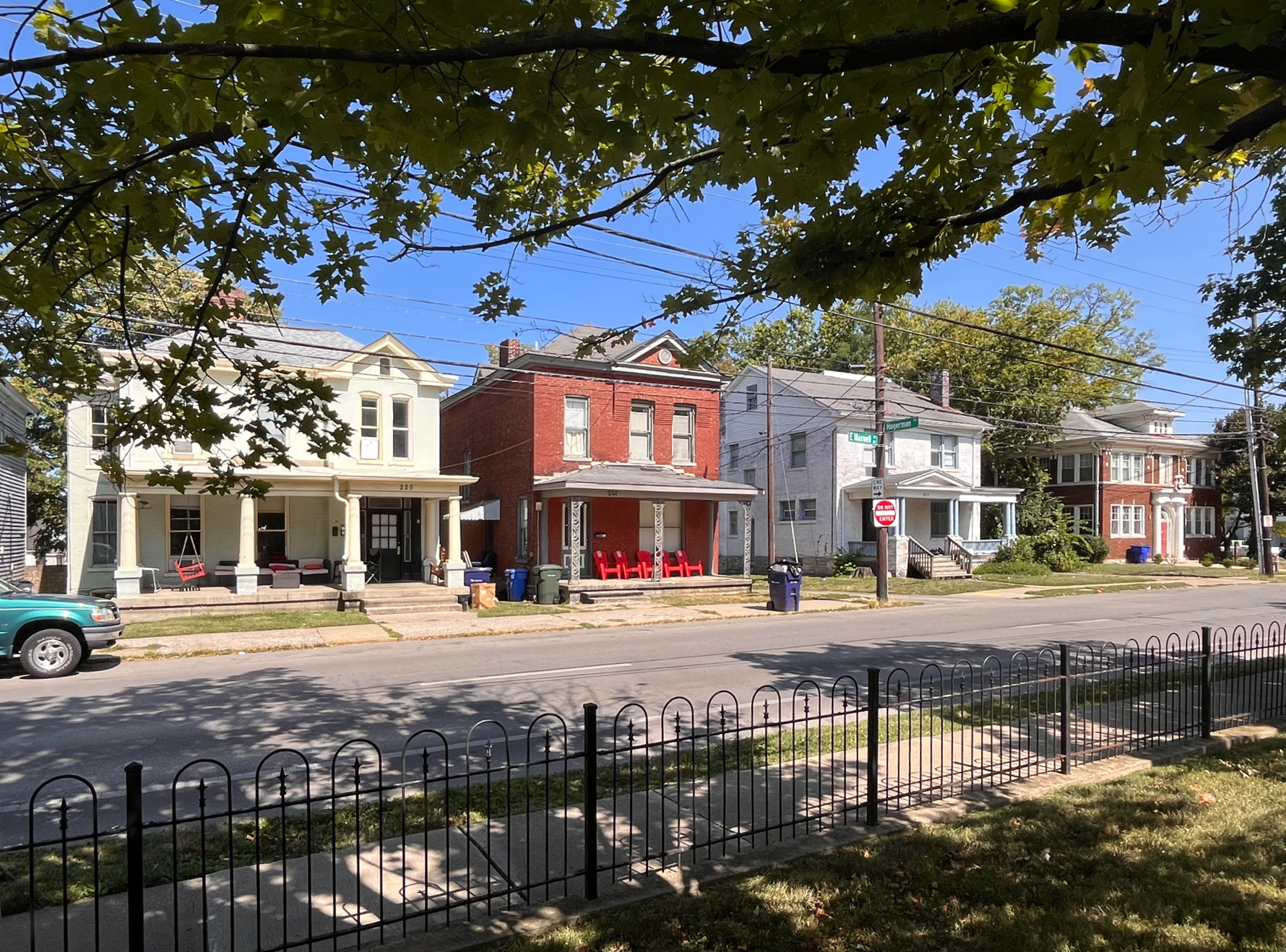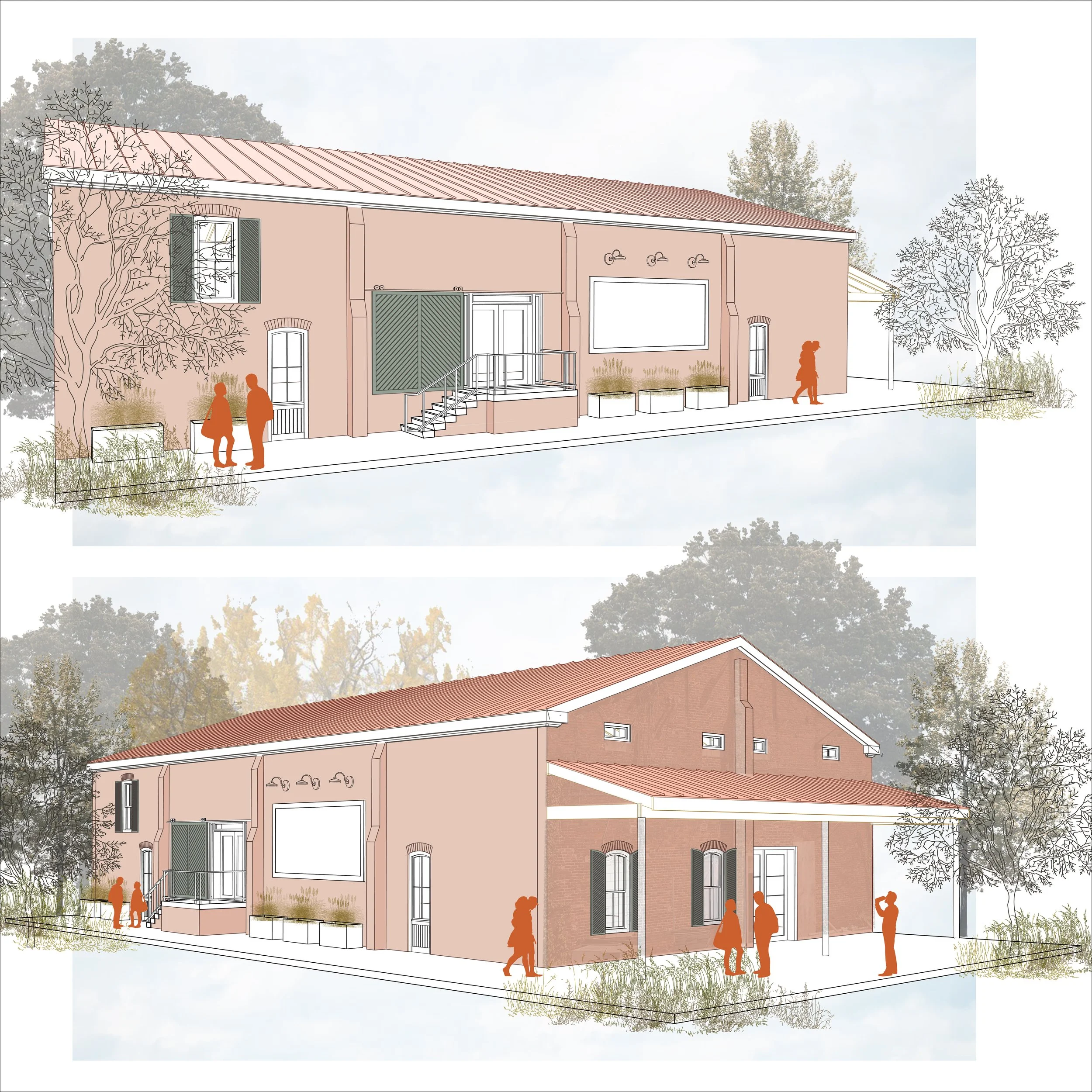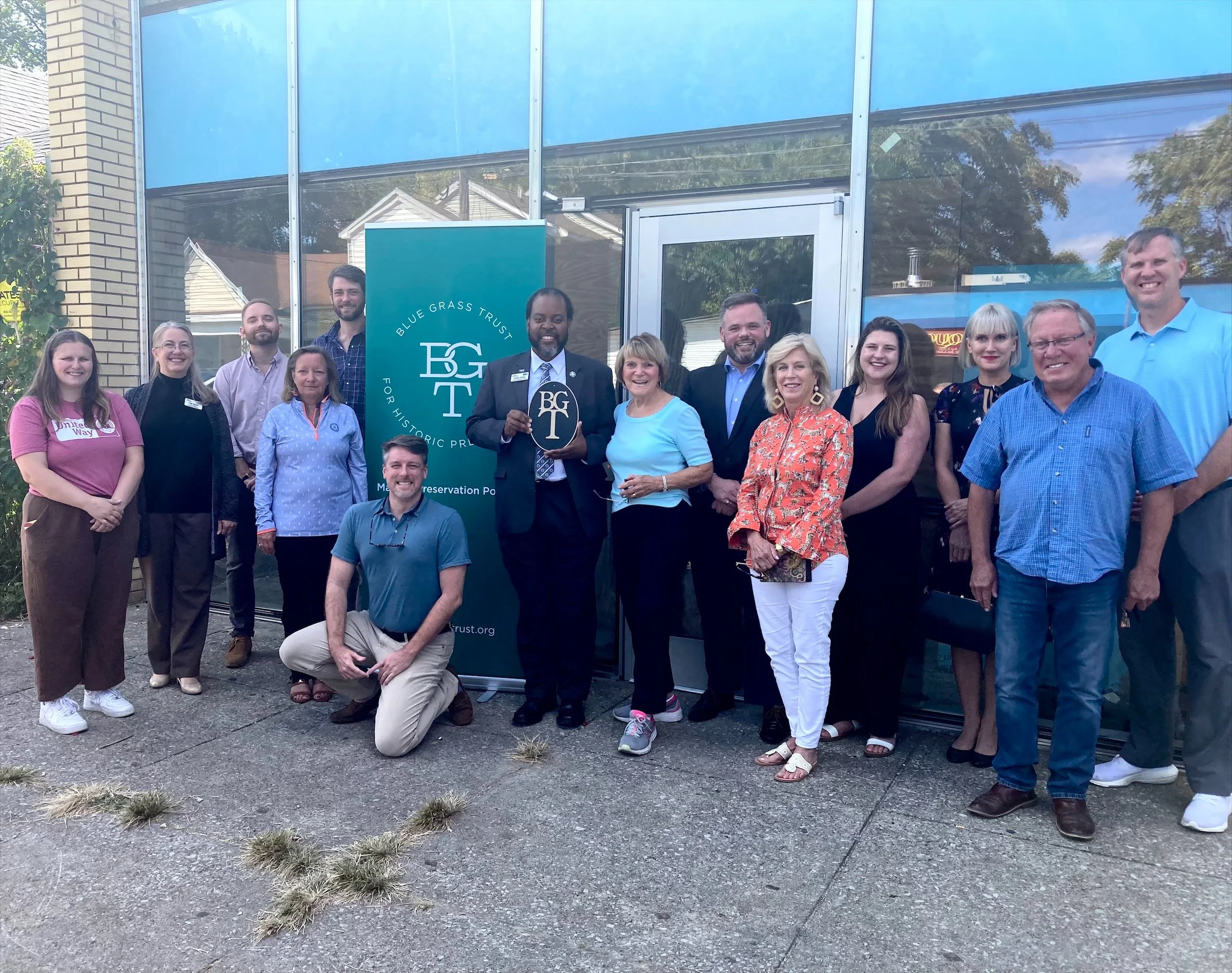ADVOCACY

The Blue Grass Trust serves as the region’s leading advocacy organization for all preservation-related matters. Since the time of our formation, the Blue Grass Trust has endeavored to create public awareness of the benefits of historic preservation and we continue to provide education, support, and advocacy for the preservation of historic places in Central Kentucky.
Through our programs, events, and outreach efforts, we strive to raise awareness about the importance of preserving the region's cultural heritage and legacy for future generations. We are dedicated to advocating for policies, programs, and initiatives that protect and promote historic sites, buildings, neighborhoods, and landscapes that are significant to our region's history and cultural heritage.
Preservation Awards
For over 30 years, the Preservation Awards have highlighted the positive, far-reaching impact that preservation plays in Central Kentucky.
-
Barbara Hulette Award: For efforts in the preservation of Central Kentucky’s history, heritage, built environment, landscape, archaeological resources, sense of community, or significant endeavors.
Clay Lancaster Heritage Education Award: Given to an individual or group for service in researching and disseminating information about the Central Kentucky region.
Clyde Reynolds Carpenter Adaptive Reuse Award: Given to an individual or group for outstanding efforts towards the rehabilitation and adaptive reuse of a building or buildings within Central Kentucky.
Community Preservation Award: Given to a non-governmental organization or individual for service to the preservation movement or to a specific project.
Dot Crutcher Award: Given to an exemplary member of the Blue Grass Trust.
Landscape Preservation Award: Given to an individual or group for the preservation, design, stewardship, restoration, or enhancement of a historic cultural landscape in the Bluegrass.
Lifetime Service to Preservation Award: Given to an individual for lifetime service to the preservation movement in Central Kentucky.
Lucy Graves Advocacy Award: Given to an individual or group that has exhibited advocacy leadership in supporting the historic preservation movement in Central Kentucky.
Lucy Shropshire Crump Volunteer Award: Given to an individual or group that has provided exemplary service to the Blue Grass Trust throughout the year.
Preservation Craftsman Award: Given to a building industry craftsman who has exhibited a strong commitment to quality craftsmanship for historic buildings.
Public Service to Preservation Award: Given to a government agency or official for service to preservation movement or to a specific project.
Yvonne Giles Award: Given to an individual, group or project for contributing to research on African American or other culturally inclusive history, advocacy of the understanding of that history, and education of the community regarding African American or other culturally inclusive history in the Bluegrass.
Saving the Lewis O’Neal Stone Tavern (5023 Old Versailles Road)
The Blue Grass Trust has been actively working with Commonwealth Property Solutions, the recent purchaser of the long-neglected 1826 Lewis O’Neal Tavern, to rescue this National Register-listed asset. A coaching inn that serviced horse caravans transporting goods from Louisville to Lexington, it is one of the only extant stone taverns in the region. Dr. Leonard has met with the new owner to discuss rehabilitation strategies, tax credit incentives, and the possibility of resale to a preservation-minded buyer; he has also produced a detailed history of the building and Slickaway/Fort Spring, the settlement in which it is located. We are confident that this rare resource – with some vision and creativity – can be brought back to its former glory. Interested parties may contact Dr. Leonard directly for details.
Historic Hemp Warehouse Adaptive Reuse
Adaptive reuse visualization
Built in the late 1880s, Hemp Warehouse No. 3 is situated along N. Upper on the former site of the Brucetown Hemp Factory. It is the last surviving structure of its kind in Lexington's urban core.
William Wallace Bruce, who was a descendant of Scottish ropemakers, established this hemp operation on the Maysville Turnpike (N. Limestone) in 1847. A four-time councilmember and alderman, he was reputed to be the largest taxpayer in the county on account of his commercial success. In 1881, Bruce transferred the factory to son-in-law W. J. Loughridge, a key participant in the Loudon area's industrial development. Loughridge continued to modernize production at the factory, which remained in operation until around 1914.
The new owner of the 707 N. Limestone parcel (which encompasses the hemp warehouse) applied for a demolition permit in September 2024. Upon learning of this development, we solicited estimates from contractors for a rehabilitation, investigated funding opportunities, and reached out to operatives in the hemp industry for support. After numerous discussions, the owner is now favoring an adaptive reuse solution that would put this important remnant of Lexington’s industrial heritage into service as retail/commercial space.
A full history of the structure and the Brucetown Hemp Factory more generally is available here. Stay tuned for project updates!
Protecting Nonprofits’ Right to an Appeal: The Commonwealth Building and KRS 100.3471
We’re thrilled to share news of a significant legal victory that could reshape the landscape of preservation advocacy across Kentucky.
For nearly six years, the Blue Grass Trust has been involved in litigation to save the formerly state-owned Commonwealth Building at 120 W High, which Thomas Page Edwards (1914-1980) designed around 1956. A member of the Army Corps of Engineers, Lt. Edwards worked alongside renowned architect Nicholas Warfield Gratz after his discharge.
In fall 2018, the Planning Commission approved the demolition of the Commonwealth Building on the grounds that it was a non-contributing element of the South Hill local historic district that was created in 1972. The case took many twists and turns as it made its way to the Kentucky Supreme Court. On the one hand, we argued that the Planning Commission ignored key expert testimony that vouched for the significance of the building – including that of city staff. On the other, we questioned the constitutionality of KRS 100.3471, a law that compelled appellants in land use cases to post enormous bonds (up to $250,000) to secure an appeal of circuit court decisions.
Thankfully, the Supreme Court concurred in a 4-3 ruling that the law undermined the government’s separation of powers and was “manifestly unconstitutional” regardless of an appellant’s assets. Our arguments concerning this “question of law” were thus affirmed. However, the justices refrained from overturning the Planning Commission’s decision, as that action had essentially answered a “question of fact” and met the basic requirement for evidentiary support. Central Dealers LLC, which owned the Commonwealth Building, applied for a demolition permit on the day the ruling came down and has already razed this historic resource. Still, the abrogation of KRS 100.3471 is a major win for advocacy nonprofits throughout the state.
Supporting Sensible Development on E. Maxwell Street and Stone Avenue
1885 Queen Anne cottage (215 E. Maxwell)
Nunan House (245 Stone Ave.)
From October 2023 to August 2024, we campaigned to save 13 National Register-listed buildings on E. Maxwell and Stone Ave from demolition. We created an online petition that garnered nearly 3,000 signatures, thoroughly researched and publicized these properties on our social media accounts, testified before the Planning Commission, and wrote op-eds before pursuing a legal appeal at the circuit court. Threatened buildings include the 1885 Queen Anne cottage at 215 E Maxwell, the 1891 brick dwelling where tobacco researcher Benjamin F. Scherffius resided (227 E. Maxwell), the 1920 Prairie-style home of mining instructor Thomas J. Barr (251 Stone Ave), and the striking Tudor-Revival bungalow at 245 Stone Ave that saloonkeeper John F. Nunan constructed for his retirement.
Regrettably, the circuit court upheld the Planning Commission’s rezoning that would allow for the placement of a 7-story student housing tower on this site. This experience has been a frustrating – but enlightening – one that revealed several questionable practices and policies at the governmental level. Dr. Zak Leonard’s latest piece in the Herald-Leader, which is also posted on our website blog, problematizes the city’s willingness to depart from its own comprehensive plans and takes issue with the internal procedures that prohibit constituents from communicating with their councilmembers on zoning matters.
Despite this outcome, we would like to thank our supporters for their engagement and assistance in sustaining this crucial grassroots advocacy. Rest assured, we will continue to campaign for sensible infill development that does not compromise Lexington’s historic and unique urban fabric. And there is a silver lining: per Stavroff Development’s most recent plan, it appears that the Nunan House has dodged the wrecking ball (at least for now).
Preserving Palmer Pharmacy
Some stories are so central to a community’s self-identity that losing them would be a disservice to current and future generations. Such is the case with the life of Dr. Zirl A. Palmer, who was just the third African-American pharmacist to practice in Lexington and the first African American to serve on the University of Kentucky’s Board of Trustees.
Dr. Palmer’s achievements, service, and triumphs over adversity are still largely unknown, but one of the last tangible reminders of his impact in the community — his former drug store at 400 E. Fifth Street — will now serve as an enduring testament to his legacy.
In October 2016, the Lexington-Fayette Urban County Government acquired Palmer Pharmacy from the Roman Catholic Diocese of Lexington, which used the building from 2000-2016 for its Catholic Action Center. Viewing the property as blighted and a liability, LFUCG issued a formal Request for Information in September 2017 but did not receive any proposals from prospective buyers. It therefore intended to demolish the building at a cost of $100,000.
However, many in the community, including the Blue Grass Trust, still believed the pharmacy could be saved. In December 2017, we organized the Palmer Pharmacy Consortium to explore the possibility of a rehabilitation by collaboratively identifying funding sources, persons or entities in need of such a space, and potential uses that would benefit the immediate neighborhood.
To finance this rehabilitation, the Blue Grass Trust secured a $50,000 matching grant from the National Trust’s African American Cultural Heritage Action Fund. While the LFUCG allocated around $300,000 for further stabilization, the Marksbury Family Foundation provided an additional $1,100,000 that catalyzed the building’s transformation into a United Way of the Bluegrass WayPoint Center. This facility, which Governor Andy Beshear and Mayor Linda Gorton opened to great fanfare on May 13, 2024, will offer health services, job placement assistance, and financial literacy education for residents of the historic East End neighborhood.



















